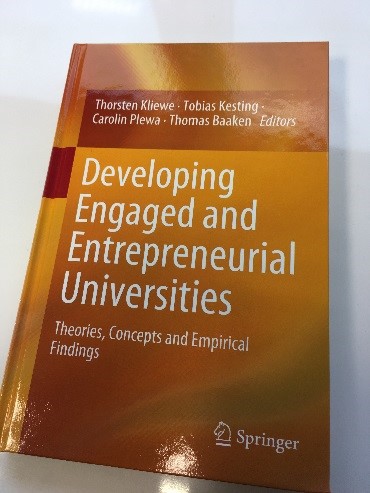10 October 2019 | Münster/Singapore
A new book on "Developing Engaged and Entrepreneurial Universities - Theories, Concepts and Empirical Findings" has been published by Springer Nature Singapore.
The editors, Prof. Dr Thorsten Kliewe, Prof. Dr Tobias Kesting, Prof. Dr Thomas Baaken, Prof. Dr Carolin Plewa are proud of being able to present new findings and reflections on a highly dynamic topic.
Higher education systems are undergoing rapid change, with increasing expectations placed on their role in society, beyond traditional roles defined by the first two missions of the university - education and research. While universities seek to maximise their positive social, economic and cultural impact, various strategic directions, missions and approaches focused on achieving such impact are evident: Business and society engagement, innovation, entrepreneurship, outreach, transfer and translation have been some of the commonly used terms referring to the kind of activities required to maximise the university's positive role in society. We consider entrepreneurship and engagement as the main pillars of this third mission and, therefore, dedicate this book towards them.
We, the editors of this book, have been strong advocates of the important role universities play in and for their communities, both through engagement and entrepreneurship, and have contributed to it over the past decades through both research and practice. Specifically, we believe in the importance of evidence-based advances, and in encouraging and communicating research that will deepen our understanding and help practitioners, management and policymakers in driving positive change. It is this aim to build a solid foundation for the development of practical tools and methods which help universities to successfully manage the change process and become more entrepreneurial and engaged that has inspired this book.
In our effort to contribute to this aim, we have brought together experts in the field to advance the current discourse. Hence, this book features scientific articles on key issues for entrepreneurial and engaged university development. Altogether it reflects multi-level perspectives in the field, namely:
- Ecosystem perspective
- Relationship perspective
- Organisational perspective
- Individual perspective
This multiplicity of perspectives reflects the complex and dynamic nature of both changes in higher education and the role universities and its individual stakeholders play and remind us of the need of combining all efforts in our quest to maximise a positive impact on the community. Additionally, we call for a more diverse and collaborative work to realise the impacts society needs.
We are grateful for the valuable time and effort many have invested in this book. First and foremost, we thank all chapter contributors for making their research results and knowledge available in this book. Second, we like to acknowledge the great help of the Springer team, especially Stephen Jones and Ambrose Berkumans, who fostered the publication of the book. Lastly, we thank the team members of the Science-to-Business Marketing Research Centre in Münster who have always supported us with their insights and a helping hand.
The book intends to broaden perspectives and deepen understanding of engaged and entrepreneurial universities. We hope that this will facilitate discussions in the scientific community and in practice alike, and contribute to the change process. Therefore, we invite our readers to join the discussion by contributing ideas, knowledge and experiences on how we can better develop the third mission through entrepreneurship and engagement and jointly shape the future of universities.
Cite as: Kliewe, T., Kesting, T., Plewa, C., & Baaken, T. (2019). Developing Engaged and Entrepreneurial Universities - Theories, Concepts and Empirical Findings. Singapore: Springer Nature. DOI: 10.1007/978-981-13-81300, ISBN: 978-981-13-8129-4



